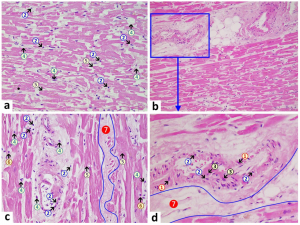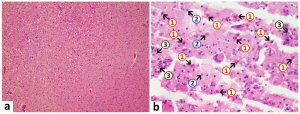

*Mörz M. A Case Report: Multifocal Necrotizing Encephalitis and Myocarditis after BNT162b2 mRNA Vaccination against COVID-19. Vaccines. 2022; 10(10):1651. doi.org/10.3390/vaccines10101651
[Translation] Zusammenfassung: In diesem Bericht wird der Fall eines 76-jährigen Mannes mit Morbus Parkinson vorgestellt, der drei Wochen nach seiner dritten COVID-19-Impfung verstarb. Der Patient wurde erstmals im Mai 2021 mit dem ChAdOx1 nCov-19-Vektorimpfstoff geimpft, gefolgt von zwei Dosen des BNT162b2 mRNA-Impfstoffs im Juli und Dezember 2021. Die Familie des Verstorbenen beantragte eine Autopsie, da die klinischen Anzeichen vor dem Tod unklar waren. Die Obduktion bestätigte die Parkinson-Krankheit. Außerdem wurden Anzeichen einer Aspirationspneumonie und einer systemischen Arteriosklerose festgestellt. Die histopathologischen Untersuchungen des Gehirns erbrachten jedoch bisher unvermutete Befunde, darunter eine akute Vaskulitis (vorwiegend lymphozytär) sowie eine multifokale nekrotisierende Enzephalitis unbekannter Ätiologie mit ausgeprägter Entzündung einschließlich glialer und lymphozytärer Reaktion. Am Herzen fanden sich Anzeichen einer chronischen Kardiomyopathie sowie eine leichte akute lympho-histiozytäre Myokarditis und Vaskulitis. Obwohl es bei diesem Patienten keine Vorgeschichte von COVID-19 gab, wurde eine Immunhistochemie für SARS-CoV-2-Antigene (Spike- und Nukleokapsidproteine) durchgeführt. Überraschenderweise konnte in den Entzündungsherden sowohl im Gehirn als auch im Herzen, insbesondere in den Endothelzellen der kleinen Blutgefäße, nur Spike-Protein, aber kein Nukleokapsid-Protein nachgewiesen werden. Da kein Nukleokapsidprotein nachgewiesen werden konnte, muss das Vorhandensein von Spike-Protein eher auf die Impfung als auf eine Virusinfektion zurückgeführt werden. Die Befunde bestätigen frühere Berichte über Enzephalitis und Myokarditis, die durch COVID-19-Impfstoffe auf Genbasis verursacht wurden.Schlussfolgerung: Zahlreiche Fälle von Enzephalitis und Enzephalomyelitis wurden im Zusammenhang mit den genbasierten COVID-19-Impfstoffen berichtet, wobei viele als kausal mit der Impfung in Verbindung gebracht wurden [31,38,39]. Dies ist jedoch der erste Bericht, der das Vorhandensein des Spike-Proteins in den enzephalitischen Läsionen nachweist und es auf die Impfung und nicht auf eine Infektion zurückführt. Diese Ergebnisse bestätigen eine ursächliche Rolle der genbasierten COVID-19-Impfstoffe, und dieser diagnostische Ansatz ist auch für potenziell impfinduzierte Schäden an anderen Organen relevant.
Choi, S., Lee, S., Seo, J.-W., Kim, M., Jeon, Y. H., Park, J. H., … Yeo, N. S.. (2021). Myocarditis-induced Sudden Death after BNT162b2 mRNA COVID-19 Vaccination in Korea: Case Report Focusing on Histopathological Findings. Journal of Korean Medical Science, 36(40)
Plain numerical DOI: 10.3346/jkms.2021.36.e286
DOI URL
directSciHub download
Show/hide publication abstract
“We present autopsy findings of a 22-year-old man who developed chest pain 5 days after the first dose of the bnt162b2 mrna vaccine and died 7 hours later. histological examination of the heart revealed isolated atrial myocarditis, with neutrophil and histiocyte predominance. immunohistochemical c4d staining revealed scattered single-cell necrosis of myocytes which was not accompanied by inflammatory infiltrates. extensive contraction band necrosis was observed in the atria and ventricles. there was no evidence of microthrombosis or infection in the heart and other organs. the primary cause of death was determined to be myocarditis, causally-associated with the bnt162b2 vaccine.”
Fillon, A., Sautenet, B., Barbet, C., Moret, L., Thillard, E. M., Jonville-Béra, A. P., & Halimi, J. M.. (2022). De novo and relapsing necrotizing vasculitis after COVID-19 vaccination. Clinical Kidney Journal, 15(3), 560–563.
Plain numerical DOI: 10.1093/ckj/sfab285
DOI URL
directSciHub download
Show/hide publication abstract
“We describe five cases of severe necrotizing vasculitis following the rna-based vaccine for severe acute respiratory syndrome coronavirus 2 (sars-cov-2), including four relapsing anti neutrophil cytoplasmic antibodies (anca) vasculitis, 27 days (1–60) after vaccination and one patient with quiescent chronic hepatitis b and de novo polyarteritis nodosa (pan) 21 days after vaccination. ten other cases were reported to the french national pharmacovigilance database: six patients with anca-associated vasculitis and four patients with pan (first symptoms 19 days on average after vaccination). five of these 10 patients developed kidney dysfunction. in conclusion, coronavirus disease 2019 (covid-19) vaccines can be associated with de novo or recurrent anca vasculitis or pan. attention should be paid to patients with known anca vasculitis or patients with a history of hepatitis b infection.”
Al-Mashdali, A. F., Ata, Y. M., & Sadik, N.. (2021). Post-COVID-19 vaccine acute hyperactive encephalopathy with dramatic response to methylprednisolone: A case report. Annals of Medicine and Surgery
Plain numerical DOI: 10.1016/j.amsu.2021.102803
DOI URL
directSciHub download
Show/hide publication abstract
“Background: since introducing the sars-cov-2 vaccination, different adverse effects and complications have been linked to the vaccine. variable neurological complications have been reported after receiving the covid-19 vaccine, such as acute encephalopathy. case presentation: in this report, we describe a 32-year-old previously healthy man who developed acute confusion, memory disturbances, and auditory hallucination within 24 hours from getting his first dose of the covid-19 moderna vaccine.eeg showed features of encephalopathy, csf investigations were nonspecific, and mri head did not depict any abnormality. he received five days of ceftriaxone and acyclovir without any benefit. discussion: extensive workup for different causes of acute encephalopathy, including autoimmune encephalitis, was negative. also, our patient improved dramatically after receiving methylprednisolone, supporting an immune-mediated mechanism behind his acute presentation. accordingly, we think the covid-19 vaccine is the only possible cause of our patient presentation, giving the temporal relationship and the absence of other risk factors for encephalopathy. conclusion: the clinician should be aware of the possible neurological complications of the different covid-19 vaccines. further research is needed to clarify the pathophysiology of such complications.”
Gao, J.-J., Tseng, H.-P., Lin, C.-L., Hsu, R.-F., Lee, M.-H., & Liu, C.-H.. (2022). Acute encephalitis after COVID-19 vaccination: A case report and literature review. Human Vaccines & Immunotherapeutics, 18(5), 2082206.
Plain numerical DOI: 10.1080/21645515.2022.2082206
DOI URL
directSciHub download
Poli, K., Poli, S., & Ziemann, U.. (2022). Multiple Autoimmune Syndromes Including Acute Disseminated Encephalomyelitis, Myasthenia Gravis, and Thyroiditis Following Messenger Ribonucleic Acid-Based COVID-19 Vaccination: A Case Report. Frontiers in Neurology, 13
Plain numerical DOI: 10.3389/fneur.2022.913515
DOI URL
directSciHub download
Show/hide publication abstract
“The global pandemic has resulted from the emergence of severe acute respiratory syndrome coronavirus-2 (sars-cov-2), causing coronavirus disease 2019 (covid-19). to control the spread of the pandemic, sars-cov-2 vaccines have been developed. messenger ribonucleic acid (mrna)-based covid-19 vaccines have been the most widely used. we present the case of a 65-year-old patient, who was diagnosed with acute disseminated encephalomyelitis, ocular myasthenia gravis, and autoimmune thyroiditis, following his third mrna covid-19 vaccination. on admission, the patient showed mild left-sided hemiparesis, contralateral dissociated sensory loss, dizziness, and right-sided deafness. brain mri revealed multiple acute inflammatory contrast-enhancing periventricular and brainstem lesions with involvement of vestibulo-cerebellar tract and cochlear nuclei. despite steroid pulse and intravenous immunoglobulin therapy, clinical symptoms and mri lesions worsened, and additional signs of ocular myasthenia gravis and elevated but asymptomatic thyroid antibodies developed. after repeated plasma exchange, all clinical symptoms resolved. this is, to the best of our knowledge, the first case report of multiple autoimmune syndromes triggered by covid-19 vaccination. the rare occurrence of such treatable autoimmune complications should not question the importance of vaccination programs during the covid-19 pandemic.”
Ancau, M., Liesche-Starnecker, F., Niederschweiberer, J., Krieg, S. M., Zimmer, C., Lingg, C., … Knier, B.. (2022). Case Series: Acute Hemorrhagic Encephalomyelitis After SARS-CoV-2 Vaccination. Frontiers in Neurology, 12
Plain numerical DOI: 10.3389/fneur.2021.820049
DOI URL
directSciHub download
Show/hide publication abstract
“We present three cases fulfilling diagnostic criteria of hemorrhagic variants of acute disseminated encephalomyelitis (acute hemorrhagic encephalomyelitis, ahem) occurring within 9 days after the first shot of chadox1 ncov-19. ahem was diagnosed using magnetic resonance imaging, cerebrospinal fluid analysis and brain biopsy in one case. the close temporal association with the vaccination, the immune-related nature of the disease as well as the lack of other canonical precipitating factors suggested that ahem was a vaccine-related adverse effect. we believe that ahem might reflect a novel covid-19 vaccine-related adverse event for which physicians should be vigilant and sensitized.”
Kobayashi, Y., Karasawa, S., Ohashi, N., & Yamamoto, K.. (2022). A case of encephalitis following COVID-19 vaccine. Journal of Infection and Chemotherapy, 28(7), 975–977.
Plain numerical DOI: 10.1016/j.jiac.2022.02.009
DOI URL
directSciHub download
Show/hide publication abstract
“We describe the first case of encephalitis following coronavirus disease 2019 (covid-19) vaccination. our patient was a 46-year-old japanese woman who presented with acute onset diplopia. subsequent magnetic resonance imaging revealed brain stem encephalitis that was rapidly responsive to high dosage steroid therapy and completely improved. although the occurrence of encephalitis after vaccination could have just been a casual temporal association, her symptoms were temporally correlated with two vaccinations. our case suggests caution and indicates treatment and prognosis, despite no evidence of a causal relationship. nonetheless, this report emphasizes the enormous benefits of vaccination, which should not be undermined.”
Flannery, P., Yang, I., Keyvani, M., & Sakoulas, G.. (2021). Acute Psychosis Due to Anti-N-Methyl D-Aspartate Receptor Encephalitis Following COVID-19 Vaccination: A Case Report. Frontiers in Neurology, 12
Plain numerical DOI: 10.3389/fneur.2021.764197
DOI URL
directSciHub download
Show/hide publication abstract
“Anti-n-methyl d-aspartate (nmda) receptor (anti-nmdar) encephalitis has been reported after sars-cov-2 infection, but not after sars-cov-2 vaccination. we report the first known case of anti-nmdar encephalitis after sars-cov-2 immunization in a young female presenting with acute psychosis, highlighting a rare potential immunological complication of vaccination against sars-cov-2 that is currently being distributed worldwide. the patient presented initially with anxiety and hypochondriacal delusions which progressed to psychosis and catatonia but returned to baseline with aggressive immunomodulatory therapy consisting of intravenous immunoglobulin, high-dose glucocorticoids, and rituximab. this study highlights that the workup of acute psychosis should include establishing a history of recent vaccination followed by a thorough neurological assessment, including for anti-nmdar antibodies in blood and cerebrospinal fluid.”
Torrealba-Acosta, G., Martin, J. C., Huttenbach, Y., Garcia, C. R., Sohail, M. R., Agarwal, S. K., … Hirzallah, M. I.. (2021). Acute encephalitis, myoclonus and Sweet syndrome after mRNA-1273 vaccine. BMJ Case Reports, 14(7), e243173.
Plain numerical DOI: 10.1136/bcr-2021-243173
DOI URL
directSciHub download
Show/hide publication abstract
“A patient presented with fever, generalised rash, confusion, orofacial movements and myoclonus after receiving the first dose of mrna-1273 vaccine from moderna. mri was unremarkable while cerebrospinal fluid showed leucocytosis with lymphocyte predominance and hyperproteinorrachia. the skin evidenced red, non-scaly, oedematous papules coalescing into plaques with scattered non-follicular pustules. skin biopsy was consistent with a neutrophilic dermatosis. the patient fulfilled the criteria for sweet syndrome. a thorough evaluation ruled out alternative infectious, autoimmune or malignant aetiologies, and all manifestations resolved with glucocorticoids. while we cannot prove causality, there was a temporal correlation between the vaccination and the clinical findings.”



